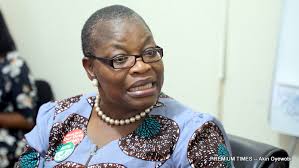
Sexual harassment hearing: Senators, Ezekwesili clash, INEC faults Natasha’s recall process
On Tuesday, tensions escalated during the hearing of a sexual harassment petition lodged by Kogi Central lawmaker, Senator Natasha Akpoti-Uduaghan. Members of the Senate Committee on Ethics, Privileges, and Petitions engaged in a contentious dialogue with former Education Minister, Oby Ezekwesili.
As the senators exchanged heated remarks with Ezekwesili, the Independent National Electoral Commission provided a temporary reprieve for the beleaguered Kogi lawmaker, citing the petitioners' failure to adhere to the recall guidelines.
Senator Akpoti-Uduaghan had been suspended by the Senate on March 6 following a contentious dispute with Senate President Godswill Akpabio regarding a new seating arrangement, which she claimed was intended to undermine her position.
The situation intensified when Akpoti-Uduaghan publicly accused Akpabio of retaliating against her for rejecting his alleged sexual advances during a national television appearance.
In response, the Senate leadership imposed a six-month suspension on her and ordered the withdrawal of her security aides.
Following these events, the troubled lawmaker filed a sexual harassment petition against Akpabio with the Senate Committee on Ethics, Privileges, and Petitions, which convened a hearing on Tuesday.
Concerns about the fairness of the proceedings arose when petitioner Suberu Yakubu, along with his legal representative Abiola Akinyode and Ezekwesili, who testified before the committee, accused the senators of bias and mishandling the petition submitted by the constituents of the suspended lawmaker.
Tensions reached a peak when Yakubu called for the committee's Chairman, Senator Neda Imasuen, to resign due to his perceived partiality in handling the sexual harassment petition against Akpabio.
“How can the chairman act as a judge in a case where he has already publicly expressed his stance? What is the purpose of presenting our case when a decision has seemingly been made prior to our hearing?” Yakubu questioned.
He further claimed that certain members of the committee had connections to Akpabio, which he believed undermined their capacity for impartiality.
This assertion provoked outrage among the committee members, who criticized Yakubu for attempting to tarnish the panel's reputation.
The lawmakers also reprimanded Ezekwesili for trying to "insert herself into the narrative" under the pretense of being a witness.
Intense Debate in the Senate
Despite the backlash, Ezekwesili maintained her desire to be heard. She stated, “I requested to be sworn in as a witness. I am a citizen of Nigeria.” However, her pleas were met with shouts from the lawmakers.
As the atmosphere grew increasingly charged, a heated exchange erupted between the former minister and Senator Peter Nwebonyi, who represents Ebonyi North.
“You cannot sit there as senators and tell me not to speak,” she exclaimed.
Nwebonyi retorted, “Do not insult me. You are telling me to keep quiet. Who do you think you are? You must be a fool, a fool at 70. That is what you are.”
“What do you mean? You are an affront to womanhood. A fool like you has no place here. Who are you?”
Once the tension subsided, Senator Patrick Ndubueze, representing Imo West, called for composure.
“We should refrain from acting like individuals in a marketplace. This is the Senate of the Federal Republic of Nigeria. It is disheartening to hear you (the petitioner) express a lack of confidence in the Senate. Such a statement implies that everyone here is untrustworthy.
“Yes, we are all citizens of this nation. However, you must be acknowledged before you can speak. That is the protocol. We cannot simply respond to inquiries because you are a petitioner. This is a Standing Committee.”
Hearing Postponed Indefinitely
Nevertheless, Imasuen decided to adjourn the hearing indefinitely, noting that both Akpabio’s wife and Akpoti-Uduaghan are involved in ongoing legal proceedings.
They also pointed out that the suspended Kogi lawmaker was absent to defend her claims.
After the hearing, Ezekwesili addressed journalists, characterizing the Senate's actions as a significant breach of the Nigerian Constitution and its legal framework.
She criticized the committee for prioritizing Senate rules over constitutional mandates, especially regarding disciplinary measures and petitions.
“The Nigerian Senate continues to assert that citizens are bound by Senate Rules, even when these rules contravene the Constitution. This is intolerable in a democratic society,” Ezekwesili stated.
She also mentioned the six-month suspension of Akpoti-Uduaghan by the Senate, contending that it was executed without proper consideration of constitutional guidelines.
“The Senate has placed its own regulations above the laws of the nation. In this instance, they have repeated this pattern—exploiting procedural gaps to evade addressing essential issues,” she remarked.
Ezekwesili supported the petitioner’s call for an independent committee to examine the case, arguing that the existing panel lacked the necessary impartiality to guarantee a fair process.
“If a petitioner expresses doubt about the Senate committee's ability to provide a fair hearing due to evident bias, it is only fair that an independent entity reviews the situation,” she emphasized.
She cautioned that the Senate's conduct could establish a perilous precedent, where internal regulations take precedence over the Constitution.
“The Senate must uphold the Constitution. Failing to do so risks transforming our democracy into a system where influential individuals manipulate procedures to silence dissent and obstruct justice,” she warned.
Concerns from INEC
In a related development, the Independent National Electoral Commission has expressed reservations regarding the petition for Akpoti-Uduaghan's recall, indicating that the petitioners did not adhere to the established recall procedures.
A group of constituents from Kogi Central had submitted a petition to the INEC seeking the recall of Akpoti-Uduaghan following her six-month suspension for misconduct imposed by the Senate.
The petition, submitted on behalf of the constituents by Charity Ijese and received by INEC Secretary Rose Oriaran-Anthony on Monday, was noted to lack comprehensive contact information for the representatives, providing only the phone number of the primary petitioner.
Additionally, INEC indicated that the petition represents voters from five local government areas—Adavi, Ajaokuta, Ogori/Magongo, Okehi, and Okene—encompassing 902 polling units across 57 registration areas.
However, the commission criticized the petitioners for offering an ambiguous address, merely stating “Okene, Kogi State,” which fails to comply with the standards set forth in its regulations.
The statement included the following: “The Commission convened its regular weekly meeting on Tuesday, March 25, 2025. Among various topics, the meeting addressed the petition for the recall of the Senator representing the Kogi Central Senatorial District.
“The recall process is established in the 1999 Constitution, the Electoral Act of 2022, and the Commission’s comprehensive Regulations and Guidelines for Recall 2024, which are accessible on our website. All petitions will be processed in strict adherence to the legal framework.
“The petition from the Kogi Central Senatorial District was accompanied by six bags of documents purportedly containing signatures from over half of the 474,554 registered voters distributed across 902 polling units in 57 registration areas (wards) within the five local government areas of Adavi, Ajaokuta, Ogori/Magongo, Okehi, and Okene.
“The commission's initial observation is that the petitioners' representatives did not include their contact address, telephone numbers, or email addresses in the covering letter that accompanied the petition, as required by Clause 1(f) of our Regulations and Guidelines.
“The address provided is “Okene, Kogi State,” which does not constitute a specific location for reaching the petitioners. Only the phone number of the lead petitioner has been supplied, in contrast to the contact information for the other representatives.”
Olumekun elaborated, stating, “The commission wishes to emphasize that the decision to recall a legislator rests solely with the registered voters of a constituency who must sign a petition expressing their loss of confidence in their representative.
“Once the petition fulfills the submission criteria outlined in our regulations, the commission will initiate the verification of signatures at each polling unit through a transparent process limited to the registered voters who signed the petition.
“Both the petitioners and the legislator facing recall will have the right to appoint agents to observe the verification process, while accredited observers and media representatives will also be permitted. At each polling unit, the verification of petition signatories will be conducted using the Bimodal Voter Accreditation System.”
INEC assured the public that the recall procedure would be carried out in accordance with legal standards, provided that the petitioners adhere to all necessary guidelines.
However, in cases where complete contact info





